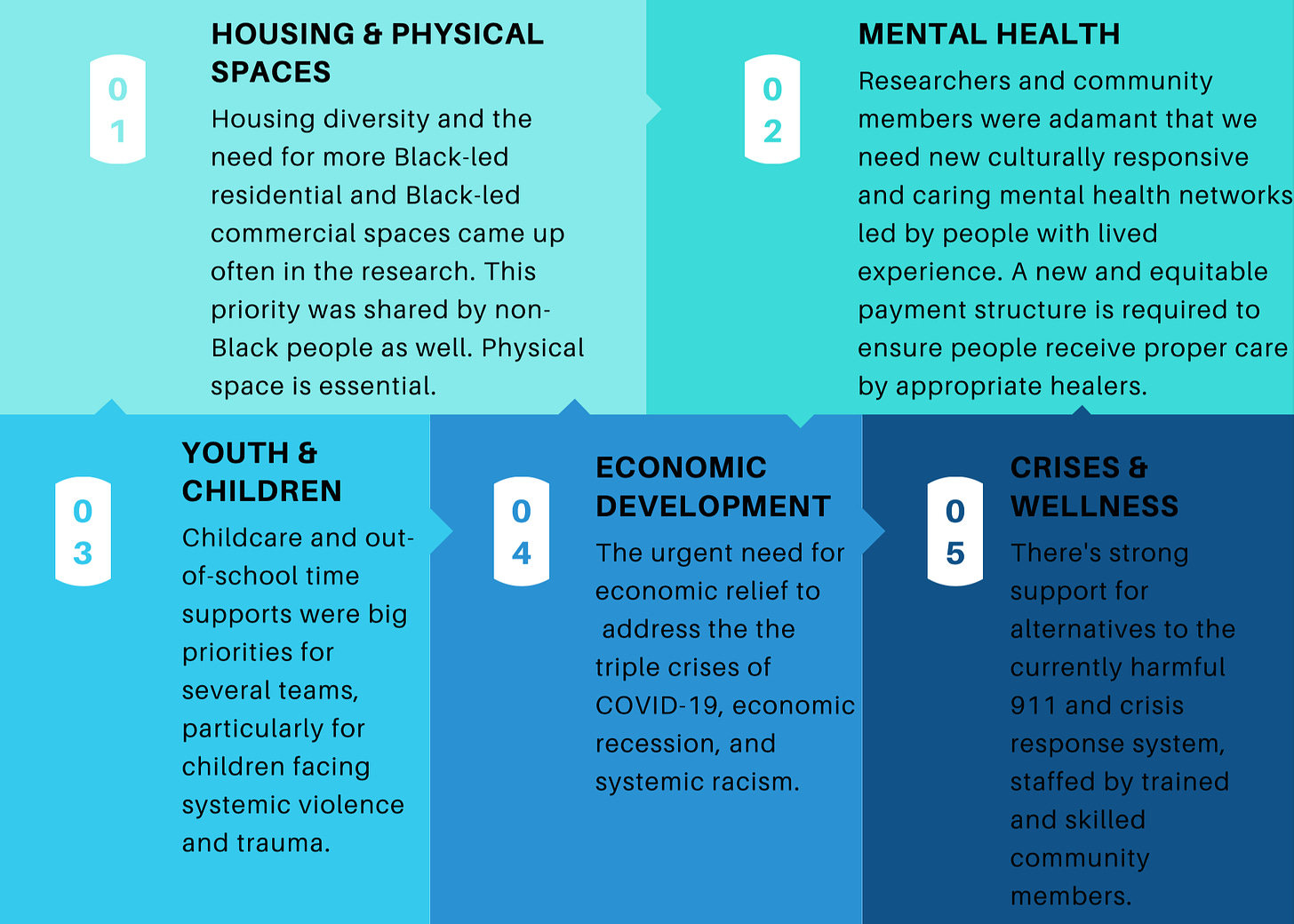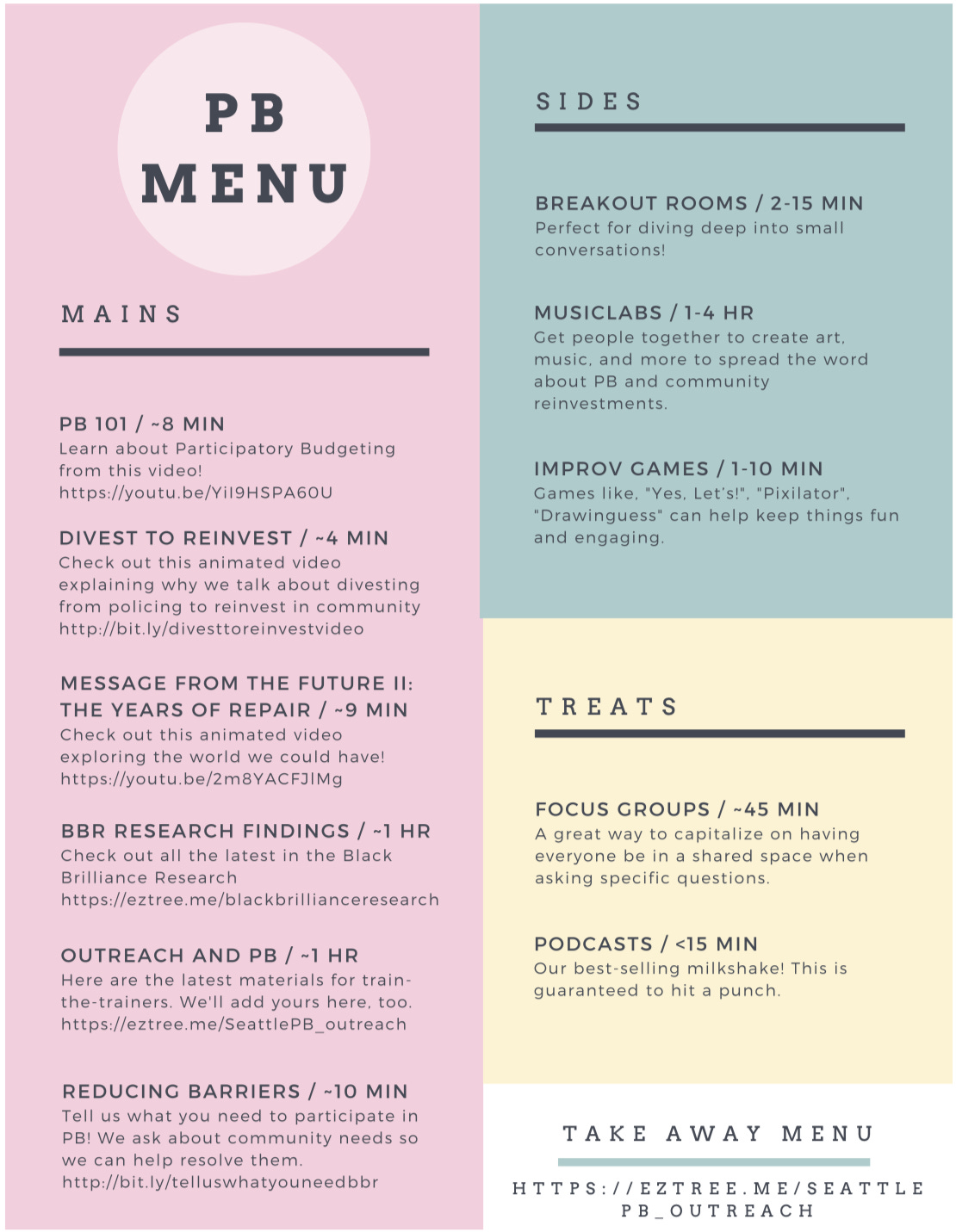Issue 2: Black Brilliance Research
We Intend to Provide
Space for collective action among people who are already involved or want to be involved in abolition work.
Structure to share useful information, educate ourselves, and hold ourselves accountable.
A jumping-off point to support the work of BIPOC researchers and creators through (among other initiatives) BBRP, PB, and Defend the Defund.
Black-led Project Updates
Black Brilliance Research Project (BBRP)
Black Brilliance researchers have nearly finished their work bringing thousands of people together to answer these three questions:
What creates true community safety?
What creates true community health?
What do you need to thrive?
Shaun Glaze: “You don’t have to ask for anyone’s permission to get involved.”
If you have not yet made your voice heard, there is still time. Take the Needs Assessment Survey found on the BBRP Eztree:
Preliminary results focus on five priority investment areas:

Further details can be found in the preliminary research findings PDF, in Shaun and LéTania’s February 1 video podcast (YouTube), and in the BBRP February 8 teach-in (Facebook).
LéTania Severe: “In every committee that is part of this research, it is important that people most likely to be harmed or killed by systemic racism are represented.”
BBRP Upcoming
For the remainder of the project, Black Brilliance Researchers will no longer be working with King County Equity Now (KCEN). This does not change the research. The final BBRP report will be submitted to Seattle City Council on February 19 and presented to Council on February 26. Both will include:
Answers to the above research questions and
Recommendations for the Participatory Budgeting (PB) process.
At that point, Council will be able to lift the proviso and release $30M for PB.
Shaun Glaze: “The research is about creating a roadmap for what PB looks like.”
-Peter (he/him)
Participatory Budgeting “Train the Trainer”
Last week, Shaun and LéTania held two "train the trainer" sessions to share resources for doing PB outreach. The session on Feb 4 was recorded and can be viewed here. All material is contained in the PB toolkit, which anyone can access after creating a (free) Canva account.
Key takeaways from the training:
We want everyone to know about PB! People often don't find out about initiatives like this until it's too late for them to get involved. By the time applications for the steering committee open in late February, we want the word to already be out there.
Use the PB toolkit to host your own teach-in or share info on social media. The toolkit includes:
A PB menu (pictured above) of different teach-in elements you can use.
Several pages of information about PB in Seattle.
A media kit (pg 13) with templates for social media posts. To use these, follow the template link, customize the image style or text to your liking, and share to your social media.
No one person or group owns the PB process, so don't feel the need to ask permission to do a certain type of outreach or work. For example, Pennie spent time writing a personal email about PB to her neighbors.
Someone asked a great question related to this: should we still reach out to people about PB if we think they might not agree with abolishing the police and other movement goals? LéTania said yes: for one thing, Seattle's PB process is special because the findings from the BBRP will set its priorities (the five buckets). So the goal really is to let everyone know, since PB is for everyone.
For the latest about Seattle PB, see the project’s Eztree:
Want to be sure you’re part of PB? Sign up here: https://decriminalizeseattle.com/participatory-budgeting/
- Alice (she/her)
Defend the Defund
The first Defend the Defund meeting was held on February 4th. Angélica Cházaro shared information on the reductions made to SPD's 2021 budget, through both budget cuts and transfers. Much of this information can be found in the Interrupting Criminalization report (p. 47-55). To sustain these wins, we need to hold our public officials accountable to preserving the SPD cuts and transfers while ensuring the money that was divested from the police is flowing into the community. This will involve closely monitoring the actions of City Council and SPD, educating the public on what is happening and organizing direct actions when needed.
If anyone is interested in joining this effort, please contact Alice Mar-Abe at alicemarabe@gmail.com or (206) 354-0236.
-Renee (she/her)
Education
Interrupting Criminalization created a report titled The Demand is Still #DefundPolice, which describes the progress made toward defunding the police in cities across the country and lessons learned along the way. Seattle is one of the cities highlighted. This report is one in a series they have released including their #DefundPolice Toolkit.
-Renee (she/her)
My friend Micah, who is one of the creators of the #8toAbolition campaign, maintains this fantastic resource guide about prisons, policing, and punishment. This is my go-to resource that I share with anyone who wants to learn more about abolition. The guide starts with general materials about abolition and the development of mass incarceration, then moves on to subtopics including LGBTQ criminalization, mutual aid, disability justice, and Christianity and abolition. He includes a good mix of books, longer readings, and shorter articles, so you can dive in no matter what amount of time you have. Personally, I'm planning to spend some time this week reading about sexual violence and anti-carceral feminism. I hope you find this useful too!
- Alice (she/her)
Project Nia put out a great new (4 minute) video called Defund Police.
If you want to dream with us, this (9 minute) video from The Leap & The Intercept carries a message from the future.
Interrupting Criminalization created this illustrated zine about abolition. The zine’s content was based off of this document from Mariame Kaba.
Divest SPD hosted “A Devil's Bargain: An abolitionist perspective on the police contract” on January 31. If you missed it, you can watch it here. The speakers emphasized that because police are not workers, we should distinguish their associations from real unions. Nikkita Oliver has been calling them "police fraternal associations."
Anna Hackman (21:20): "We need to be in solidarity with this movement to make the collective bargaining agreements and the SPOG negotiation process public. Because they are not working class, they are not workers in the same way that we are workers. And because their role in a capitalist state is so fundamentally different from ours, their negotiation process needs to be public. They need to be accountable to us."
-Peter (he/him)
Direct Support
“Real Rent Duwamish calls on people who live and work in Seattle to make rent payments to the Duwamish Tribe. Though the city named for the Duwamish leader Chief Seattle thrives, the Tribe has yet to be justly compensated for their land, resources, and livelihood. All funds go directly to Duwamish Tribal Services (DTS) to support the revival of Duwamish culture and the vitality of the Duwamish Tribe. Generations of Seattleites continue to benefit from the Duwamish People's presence and stewardship of this land—we could not call this city home without the Duwamish Tribe.”
Learn more about Real Rent Duwamish here; if you are interested in starting to make real rent payments, one can do so here. In addition, we encourage you to learn more about and engage with the history of the Duwamish Tribe and the past and present effects of settler colonialism in present-day Seattle.
- Anders (they/them)
“Covid-19 Mutual Aid – Seattle is a completely grassroots, volunteer-run formation predominantly co-led by queer femmes of color who live our lives within the communities who we are working to support… Our distribution model is built on trust and self-stated need, and made possible through a non-hierarchical web of individuals working in service of the greater collective. We know that neoliberal individualistic public health hurts us all. We work to provide diverse support to our communities most impacted by the Covid-19 pandemic.”
You can donate here and follow them on instagram and facebook @covid19mutualaid for more ways to support. They recently released a community report that describes their formation and highlights their incredible and vital work towards food sovereignty, abolition and solidarity with those most impacted by structural oppression and the Covid-19 pandemic.
-Renee (she/her)
Sacred Community Connections, led by Ahkia Veshay, works on adult healing by securing housing, access to tools, mental health services, and mutual aid.
Ahkia Veshay: “As a lot of us folks who lived without homes move into spaces where we are housed and where we are finding stability, it can be very very hard to move at the flow that society needs you to move in in order to be deemed ‘successful’, in order to be deemed ‘stable’. A lot can come up and a lot can trigger and re-trigger the fear of being houseless. In dealing with these systems that have built in traps, it’s very very easy to end back up in the streets or to end back up in the sex trade in the street economy, or to fall back into using.”
Among other things, SCC is launching peer-based support groups for people who are making such transitions. You can support Veshay’s work via venmo @Ahkia-Veshay-1 or cashapp $KiaVeshay.
-Peter (he/him)
Artwork
Poster by Cristy Road Carrera
Join us
Reach out to one of us individually or read our guiding principles and join us here.



